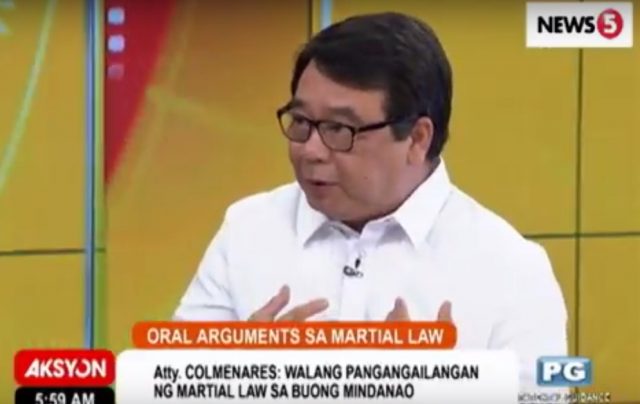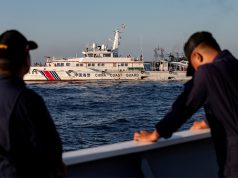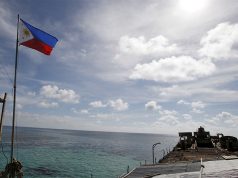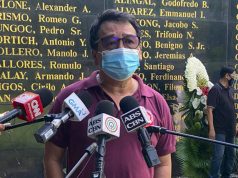MANILA – During oral arguments Tuesday at the Supreme Court, petitioners against the extension of Martial Law in Mindanao articulated their view of the terms rebellion, invasion, and public safety as the basis for declaring Martial Law.
Atty. Christian Monsod, a member of the 1986 Constitutional Commission and one of the petitioners in G.R. No. 236155 seeking a review of the factual basis of the further extension of Martial Law and the suspension of the privilege of the writ of habeas corpus, argued that there should be “actual rebellion” for Martial Law to be acceptable.
“Because if you include the concept of imminent danger, that’s where a lot of things could go wrong. Giving the President too much discretion in declaring Martial Law … that is not the intent of the Constitution,” he said.
But, Justice Lucas Bersamin argued, Martial Law is a “weapon” used by the commander-in-chief to enable the Philippines to survive a threat. Using the word “actual” may “constrict” one’s perspective on the matter “because we are averse to the use of authoritarianism. But that is no longer the reality today. There is now a kind of threat that is beyond authoritarianism, that is beyond our borders, and we are threatened within our borders.”
He asked, “Will you be averse to the idea that I am proposing, you could use Martial Law to repel or quell such kind of threat?”
Monsod replied, “I don’t think that’s the intent of the Constitution, to broaden the basis for declaring Martial Law.”
Prodded further, Monsod said that he was confining the definition of rebellion to the one under the Revised Penal Code. The question of going beyond this definition, he said, was discussed in the 1986 Constitutional Commission, and the decision was that they would abide by the definition in the Revised Penal Code.
Article 134 of the Penal Code reads: “The crime of rebellion or insurrection is committed by rising publicly and taking arms against the Government for the purpose of removing from the allegiance to said Government or its laws, the territory of the Philippine Islands or any part thereof, of any body of land, naval or other armed forces, depriving the Chief Executive or the Legislature, wholly or partially, of any of their powers or prerogatives.”
Bersamin then asked Monsod what his definition of invasion was. The latter was briefly able to get out “Invasion is a foreign …” before Bersamin piped in with “an enemy coming into our borders.”
Bersamin then asked if Monsod did not consider invasion “posed from afar” by drones or automatons, without necessarily taking Philippine land.
To this, Monsod replied, “The political purpose of rebellion [he might have been referring to invasion] is to take sovereignty and territory from the Philippines or any part of the Philippines or any land, sea or other forces of the Philippines. It is essentially a territorial threat.”
Bersamin then asked if Monsod would be inflexible in his traditional definition. Monsod said he would, because the Constitution is clear and has a narrow take on the matter.
Bersamin then pointed out that he was asking about the spirit of the letter, to which Monsod replied that the intent of the Constitution is for it to be followed strictly.
One of the reasons that Section 18 was worded as such in the 1987 Constitution, which says that “In case of invasion or rebellion, when the public safety requires it, (the President) may, for a period not exceeding sixty days, suspend the privilege of the writ of habeas corpus or place the Philippines or any part thereof under martial law,” is because, said Monsod, “to make sure that the 1972 experience of the country is never repeated.”
For his part, former Bayan Muna Representative Neri Colmenares, one of the petitioners in G. R. No. 236061 who are seeking to declare null and void Congress’ approval of the extension of Martial Law and the suspension of the privilege of the writ of habeas corpus, said that the government is using “imagined threats” if only to justify Martial Law.
Asked by Senior Associate Justice Antonio Carpio whether the petitioners are saying that since the initial declaration of Martial Law was based on the Maute Group’s rebellion in Marawi City, then Martial Law cannot be extended based on the rebellion of the New People’s Army, Colmenares replied that was correct.
Carpio then remarked that the government’s apparent remedy could be to declare a new Martial Law with respect to the NPA rebellion, but not to use the latter to extend Martial Law for the Maute Group’s rebellion.
He then asked Colmenares about a possible scenario of invasion. If North Korea assembles its warships to invade the Philippines, and are within 100 nautical miles from Batanes, can the President declare Martial Law, assuming public safety requires it? Is there actual invasion?
Colmenares said he thought so.
Carpio then asked whether there is actual invasion given another scenario involving North Korean leaders planning in their headquarters to invade the Philippines.
Colmenares said there is no invasion.
Therefore, said Carpio, actual invasion does not necessarily mean that the invaders have landed on Philippine shores.
He provided another scenario where the Chinese seize Scarborough Shoal, which is Philippine territory. This is invasion because they control the area, but does public safety require the declaration of Martial Law?
Colmenares replied that he and the other petitioners define public safety differently from the respondents, who posit that, if there is rebellion or invasion, it definitely threatens public safety.
But for the petitioners, this is not so, because if this “generic” definition of public safety is used, there will be Martial Law all over the country because rebellion exists everywhere.
For the petitioners, said Colmenares, the moment the action of the Chinese results in the courts being unable to open and the government being unable to operate, then it can be argued that the element of the public safety requiring it is present.
Colmenares added that rebellion does not necessarily threaten public safety. There are three situations of rebellion according to the Constitution:
Rebellion where the government can contend with it through the regular use of its powers
Rebellion where the government finds it necessary to call out the armed forces
Rebellion that threatens public safety when government operations are substantially impaired.
Carpio then asked if two people can commit rebellion.
Colmenares said they can.
Carpio then asked whether public safety is in danger from these two people.
Colmenares said that he did not think so, and that this is an example of a form of rebellion where the government can respond using its regular powers.
“Yes, you don’t have to declare Martial Law to quell a rebellion of two people, because public safety is not endangered by these two people,” Carpio concluded.










